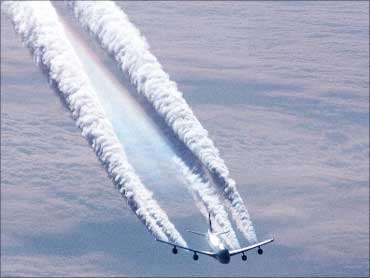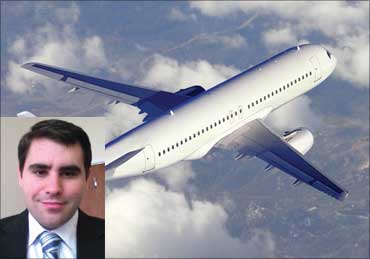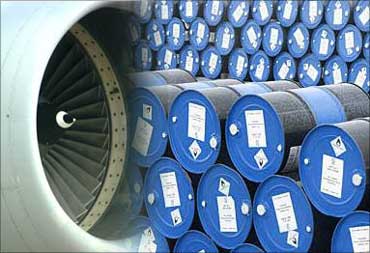
Aircraft flying above North America and Europe are emitting pollutants that are poisoning the air in India and China, and resulting in deaths of thousands of people in these Asian nations, a new study has said.
The study led by a team at the Massachusetts Institute of Technology says airplanes flying at a cruise altitude of around 35,000 feet emit pollutants that contribute to about 8,000 deaths per year globally.
Due to high speed winds that flow east, air pollution caused by planes flying over North America and Europe is adversely impacting air quality in India and China, it said.
Nearly 3500 people - almost half of the global number - die in India and China due to this air pollution. Air travel is heaviest above North America and Europe.
"Even though the amount of fuel burned by aircraft over India and China accounts for only 10 per cent of the estimated total amount of fuel burned by aircraft across the globe, the two countries incur nearly half - about 3,500 - of the annual deaths related to aircraft cruise emissions," the study said.
. . .

The research provides the first estimate of premature deaths attributable to aircraft emissions at cruise altitudes.
Aircraft emit nitrogen oxides and sulfur oxides, which react with gases already existing in the atmosphere to form harmful fine particulate matter.
Part of the reason for the high percentage of premature deaths in India and China is that these regions are densely populated and also have high concentrations of ammonia in their atmosphere as a result of farming.
This ammonia reacts with oxidised nitrogen and sulphur to create fine particulate matter that people inhale on the ground.
Although agriculture is abundant in Europe and North America, the ammonia levels are not as elevated above those regions as they are in the Asian countries, the study said.
. . .

The analysis also revealed that although every country in the Northern Hemisphere experienced some number of fatalities related to these emissions, almost none of the countries in the Southern Hemisphere had fatalities.
"That is because the majority of air traffic occurs in the Northern Hemisphere, where planes emit pollutants at altitudes where high-speed winds flowing eastward, such as the jet stream, spread emissions to other continents," according to the study.
Though aircraft emissions are regulated, current guidelines only apply to low-altitude flights travelling at 3,000 feet.
"That is because regulators have assumed that anything emitted above 3,000 feet would be deposited into a part of the atmosphere that has significantly smoother air," meaning fuel waste would not circulate back to the ground, the study said.
. . .

Even though 90 per cent of aircraft fuel is burned at cruise altitudes, only those pollutants that are emitted during takeoff and landing are regulated.
"Anything above that (altitude) really hasn't been regulated, and the goal of this research was to determine whether that was really justified," says the study's lead author Steven Barrett, Assistant Professor of Aeronautics and Astronautics in MIT's Department of Aeronautics and Astronautics.
To study the effects of cruise emissions, Barrett used a computer model that combined data about plane trajectories, amount of fuel burned during flights and the estimated emissions from those flights.
He combined that with a global atmospheric model that accounts for air-circulation patterns in different parts of the globe.
He then used data related to population density and risk of disease in different parts of the world to determine how the change in particulate matter over certain regions might affect people on the ground - specifically, whether the air pollutants would lead to an increased risk of death.
. . .

The study recommends that cruise emissions be "explicitly considered" by international policymakers who regulate aviation engines and fuels.
Steve Lott, a spokesman for the International Air Transport Association, a trade group that represents 230 airlines, says that aviation is "a small part of a big problem," particularly when compared to other transportation sources of emissions, such as those caused by shipping, which a 2007 study linked to 60,000 premature deaths per year.
In 2004, the World Health Organisation estimated that about one million deaths per year are caused by air pollution.
Several epidemiological studies have linked air pollution to the development of cardiovascular and respiratory illnesses, including lung cancer.
Increased exposure to fine particulate matter caused by air pollution is linked to health problems like chronic bronchitis and decreased lung function, as well as premature death.